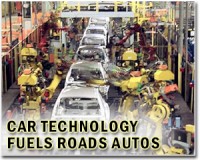 |
Washington DC (SPX) Apr 21, 2011 Researchers in America have shown that ozone-a known pollutant at low levels in the earth's atmosphere, causing harmful effects on the respiratory system and sensitive plants-can be reduced, on average, when electric vehicle charging is done at night time. Ozone forms as hydrocarbons and nitrogen oxides, emitted into the air, react with sunlight. Two of the largest emitters of these pollutants are vehicles and electricity generating units (EGUs) with some of the most densely populated regions in the US still failing to meet the National Ambient Air Quality Standards after 30 years of regulation. Plug-in Hybrid Electric Vehicles (PHEVs) have risen in popularity over the past decade as a result of cheaper fuel costs (versus gasoline), increased efficiency, and positive impact on the environment due to lack of exhaust fumes. Charging PHEVs at night time is known to be more cost-effective and reliable; however, researchers publishing their work in IOP Publishing's journal Environmental Research Letters, have now found that charging at this time also leads to lower levels of pollution on average across four cities and over four representative modelling days. PHEVs have the capability to run off battery power and gasoline. When PHEVs run off battery power they emit no pollutants from their exhaust, however, the EGU's- which provide electricity to charge batteries-do give off pollutants. As such, researchers at the Massachusetts Institute of Technology (MIT) and the University of Texas modelled the effect of replacing 20% of the vehicle miles travelled (VMT) by gasoline-run cars with PHEVs, using three different electric car charging scenarios to study the emission of pollutants, specifically ozone, in the state of Texas. There has been much debate regarding the best way to charge electric cars. The first scenario in this study was based on charging the car at off-peak times in the night. The second scenario involved charging to maximize battery life (charging just before use and only the amount of charge needed to complete the trip) and the third scenario involved charging the battery when it was a convenient time for the driver (typically just after vehicle use). The results of the study showed that the overall levels of pollution, resulting from EGU emissions associated with charging, were lower than the level of pollution resulting from the emissions associated with 20% of gasoline VMT. Although night time charging was shown to yield the highest amount of nitrogen oxides, this led to the least amount of ozone on average across all cities and hours modelled as there is no sunlight for the emissions to react with. By the time morning comes, the pollutants are dispersed and diluted by other processes such as the wind. The lead author Dr Tammy Thompson of MIT said: "The results in general show positive air quality results due to the use of PHEVs regardless of charging scenario with the nighttime charging scenario showing the best results on average by a small margin." "This further supports efforts to develop regulation to encourage nighttime charging; an example would be variable electricity pricing. As more of the fleet switches over to PHEVs and a larger demand is placed on the electricity grid, it will become more important that we design and implement policy that will encourage charging behaviours that are positive for both air quality and grid reliability." The journal paper can be found here.
Share This Article With Planet Earth
Related Links Institute of Physics Car Technology at SpaceMart.com
 Toyota to cut China output by 50-70% until June 3
Toyota to cut China output by 50-70% until June 3Tokyo (AFP) April 20, 2011 Toyota said on Wednesday it will reduce auto production at its Chinese plants by 50-70 percent until June 3, citing a parts shortage after Japan's earthquake and tsunami disaster. Toyota previously announced production disruptions domestically and in the United States, European Union and Australia because of the crisis. As a result of the March 11 tragedy, Toyota said "it has decided tha ... read more |
|
| The content herein, unless otherwise known to be public domain, are Copyright 1995-2010 - SpaceDaily. AFP and UPI Wire Stories are copyright Agence France-Presse and United Press International. ESA Portal Reports are copyright European Space Agency. All NASA sourced material is public domain. Additional copyrights may apply in whole or part to other bona fide parties. Advertising does not imply endorsement,agreement or approval of any opinions, statements or information provided by SpaceDaily on any Web page published or hosted by SpaceDaily. Privacy Statement |